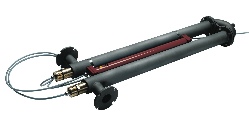UV-C light is basis of effective water treatment to protect against growth of bacteria

Described as the most effective approach to using ultra-violet light to kill bacteria in water systems — Tour & Andersson’s Aqua+.
An approach to preventing the growth of legionella bacteria in all types of water system from Tour & Andersson is based on UV-C lamps in a titanium casing. The UV-C light passes through the water and, in combination with the titanium casing, which contains titanium dioxide, results in the generation of hydroxyl radicals from the water molecules. These hydroxyl radicals seek out other molecules and oxidise and kill them. Aqua+ has been independently tested by the Department for Clinical Bacteriology at the University of Gothenburg and proved to remove all micro-organisms from both hot- and cold-water systems. Legionella bacteria in the water are said to be killed in just one pass through the Aqua+ unit, and the chemical condition of the water is unchanged. Peter Rees, technical manager of Tour & Andersson, says, ‘When compared to the conventional method of UK treatment, it is significantly more effective because the “shadowing” effect of molecules, that can occur with standard UV treatment, is removed — ensuring that all of the legionella bacteria which may be present in a system are removed. ‘By designing a system with Aqua+ at the entrance as a “gate keeper”, the specifier can be confident that all the water entering the system has been treated and is legionella free.’ The process also kills the micro-organisms that create biofilm, the breeding ground for bacteria such as legionella. Biofilm is also responsible for 20 to 70% of corrosion in systems. Two sizes can treat up to 5 and 25 m3/h of water and consume 15 and 180 W, respectively. The tubes are rated for 9000 h of continuous operation and should be changed once a year.
Related links:


